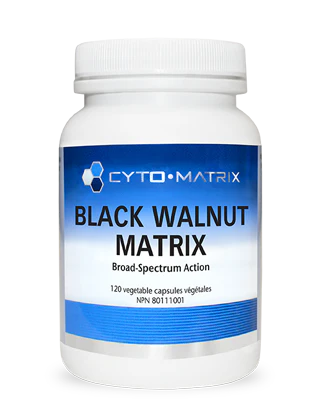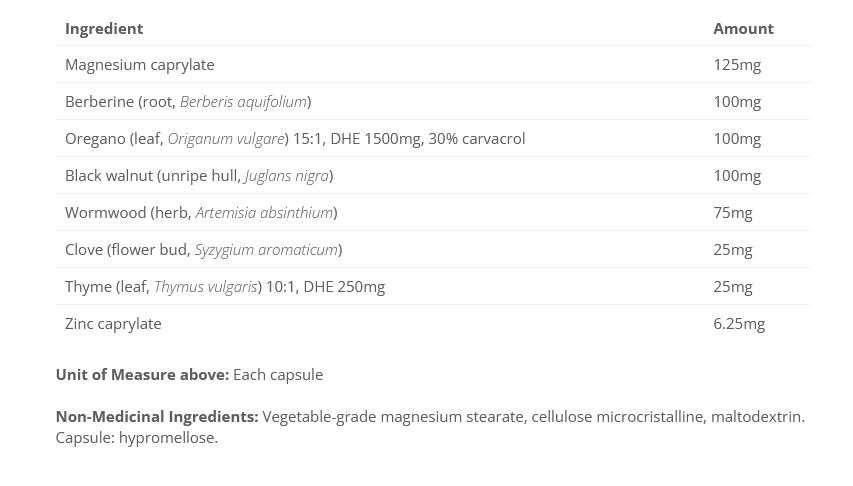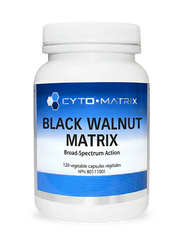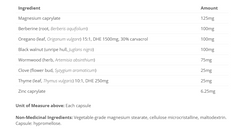



Black Walnut Matrix
- 46.99$
0.00$- 46.99$
- Unit price
- per
Description
x- A blend of antimicrobial herbs and nutrients for comprehensive antibacterial, antiparasitic, antifungal, and antiviral action. Garlic-free and FODMAP-friendly.
- Designed to be a balanced blend of herbs and nutrients to fight pathogenic bacteria, parasites, fungi, Candida and viruses
- Caprylic acid is a medium-chain triglyceride with powerful anti-Candida capabilities
- Berberine is included as a broad-spectrum antimicrobial agent with additional benefits for blood sugar and lipid balance
- Black walnut and wormwood have traditionally been used for their antiparasitic effects, and now more modern research is recognizing wormwood for its antimalarial abilities.
- Both clove and thyme exhibit anti-biofilm action, which may be an important consideration in stubborn gastrointestinal infections or dysbiosis.
- Garlic-free to allow tolerance in people on a low FODMAP diet
The human microbiome is a delicate balance of bacteria and other microbes. It is constantly changing and resists opportunistic or infectious growth by internal and external pathogens, including bacteria, parasites, fungi, and viruses. In some cases, these pathogenic microbes can become permanently established in the gastrointestinal tract or cause persistent digestive symptoms such as diarrhea, abdominal pain, flatulence, and bloating. Although pharmaceutical agents can eradicate these pathogens, plant extracts and natural antimicrobial nutrients have traditionally been used successfully.
Caprylic acid, also known as octanoic acid, is a medium-chain triglyceride found naturally in coconut and palm oil, as well as human breast milk. While it contains numerous antimicrobial properties, the most recognized by far is its anti-Candida action. Candida species are naturally found in the human digestive tract, but they are well known to be opportunistic, meaning that overgrowth is common with antibiotic use and other stressors. Caprylic acid has traditionally been used successfully not only for gastrointestinal fungal overgrowth but also for external yeast infections.
Clove (Syzygium aromaticum) is another herb traditionally used to treat bacterial and fungal infections, including Candida species. More recent research has confirmed that perhaps one of the mechanisms involved in its success against Candida albicans is its ability to disrupt the protective biofilm. This is important because when Candida albicans develops a mature biofilm, it has been shown to be more than 1,000 times more resistant to antifungal drugs. Berberine is a potent alkaloid found in several plant species such as goldenseal, Oregon grape, and barberry. By far, most clinical research on berberine has focused on its ability to improve insulin, blood sugar regulation, and metabolic function. However, it has traditionally been delivered as a digestive tonic with broad-spectrum antimicrobial actions. Research has confirmed that berberine can effectively combat bacteria, viruses, fungi, and parasites by inhibiting microbial growth, endotoxin formation, bacterial adhesion, and viral replication. Clinical trials have shown that berberine can effectively treat the symptoms of bacterial diarrhea and intestinal parasites. Additionally, berberine can improve the integrity of tight junctions in the digestive tract and, therefore, positively affect intestinal permeability. Finally, berberine can regulate gastrointestinal motility and increase the endogenous production of butyrate, a short-chain fatty acid that provides fuel and anti-inflammatory support in the colon.
Oregano oil (Oreganum vulgare) has long been used as a powerful, broad-spectrum antimicrobial agent capable of preventing infections, boosting the immune system, and improving digestion. Oregano oil naturally contains a variety of antimicrobial compounds, including thymol, but the most notable active ingredient is carvacrol. Animal research has shown that oregano can increase survival rates in mice infected with Staphylococcus aureus and Candida albicans by 43% and 80%, respectively, after 30 days. Oregano oil has also been shown to reduce parasite counts in people with digestive infections.
The fruit shell of the black walnut (Juglans nigra) is a common antiparasitic treatment in traditional medicine, although in vitro studies have shown that various black walnut extracts have antifungal, antimicrobial, and anthelmintic properties. The main reason for this appears to be its high tannin content, containing up to 45% tannin concentration. Like black walnut, Artemisia species have also been used anecdotally and traditionally as an antiparasitic agent. However, unlike Juglans nigra, Artemisia has received considerable attention in recent years as a validated primary treatment for uncomplicated malaria. The active ingredient responsible for this antimalarial action is artemisinin, a bitter sesquiterpene lactone common to all Artemisia species. Artemisia absinthum has now been studied to have not only antiparasitic action against Plasmodium, Leishmania, and Trichomonas species, but also antibacterial, antifungal, and hepatoprotective abilities. These actions, in addition to its bitter taste, may partly explain why Artemisia absinthum is officially recognized as a digestive tonic for loss of appetite, dyspepsia, and bile secretion disorders by various European medical agencies. Finally, thyme (Thymus vulgaris) is a carminative herb commonly used in cooking and is traditionally used as a remedy for digestive problems such as colic and dyspepsia. Its phenolic and flavonoid compounds, such as thymol, geraniol, and thujanol, are thought to be responsible for thyme's antiadhesive and bactericidal actions. Similar to clove extract, thyme is perhaps most valuable as an anti-biofilm agent because it can effectively combat resistant microbes with additional protective measures for survival. For example, thyme has demonstrated antimicrobial activity even against multidrug-resistant strains of staphylococcus species.
Cyto-Matrix's Black Walnut Matrix combines all of these antimicrobial herbs and compounds into one powerful blend to support digestive health and microbial balance in cases of dysbiosis or infection. Together, the ingredients are effective against pathogenic bacteria, parasites, fungi (including Candida), and viruses. Additionally, Black Walnut Matrix provides anti-biofilm action to more effectively combat resistant microbes that have taken up residence and protective measures for survival. Each bottle contains 120 vegetarian capsules.
Produits recommandés
Produits récemment consultés
- Choosing a selection results in a full page refresh.



